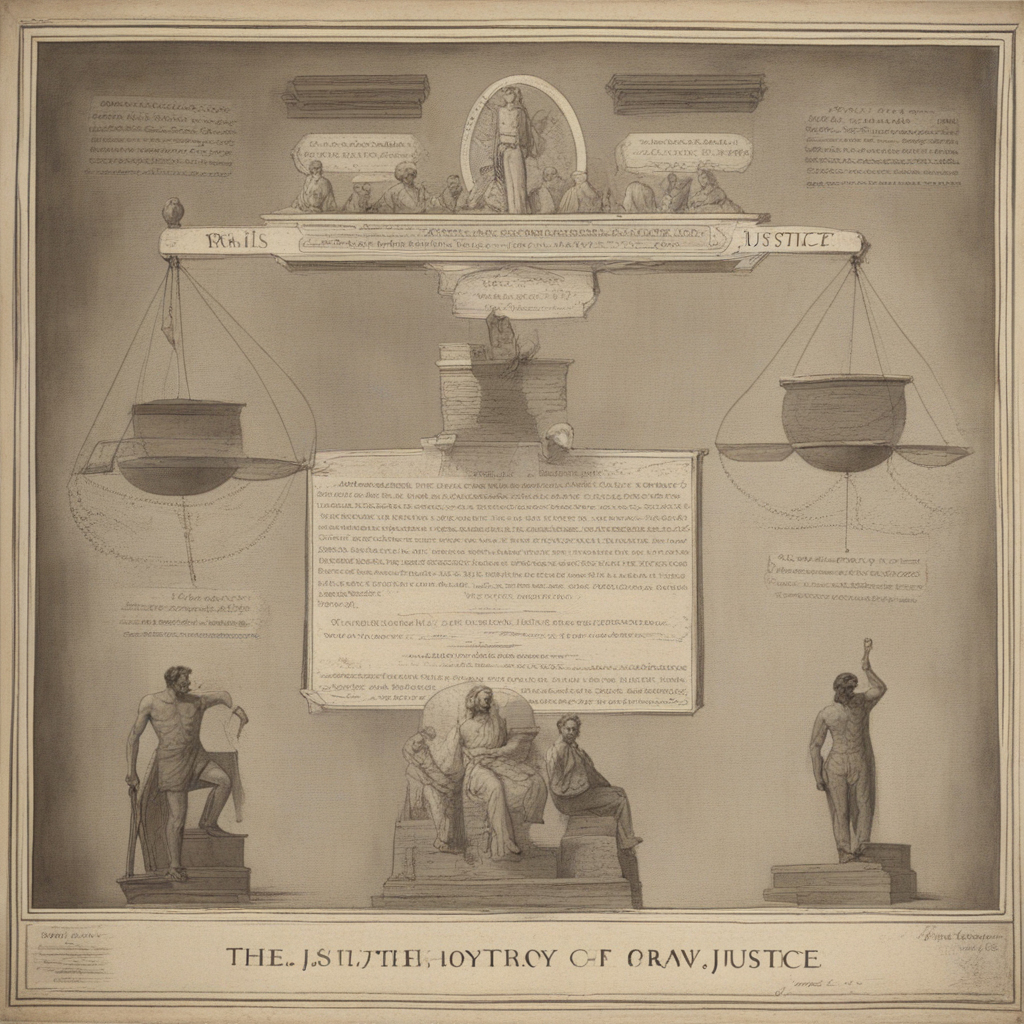존 롤스(JohnRawls 1921~2002)는 자유와 평등의 가치를 공정하고 합리적인 방식으로 조화시키는 것을 목표로 하는 정의 이론을 제안한 미국의 철학자로 그의 이론은 사람들이 사회를 지배해야 할 기본 원칙에 합의하는 사회 계약이라는 개념에 기초합니다.

롤스(Rawls) 정의론, 무지의 베일 5분 안에 이해하기
롤스(Rawls) 정의론 이해하기
그러나 홉스, 로크, 루소 등 전통적인 사회계약 이론가들과 달리 롤스는 사람들이 이미 자유롭지만 불안정하고 취약한 자연 상태에 있다고 가정하지 않습니다. 대신 그는 사람들이 자신의 재능, 선호도, 사회적 지위, 심지어 선에 대한 개념과 같은 자신의 개인적인 특성에 대해 아무것도 알지 못하는 무지의 베일 뒤에 있는 가상의 상황, 즉 원초적 입장이라는 가상의 상황을 상상합니다.
이 상황에서 사람들은 이성적이고 상호 무관심하여 자신의 이익은 증진하고 싶지만 타인의 이익은 신경 쓰지 않게되는데 롤스는 원래의 입장에서 사람들은 주요 정치, 법률, 경제 제도를 포함하는 사회의 기본 구조를 규제하기 위해 아래의 두 가지 정의의 원칙을 선택할 것이라고 주장합니다.
첫 번째 원칙은 평등 기본 자유의 원칙으로, 각 개인은 모든 사람을 위한 유사한 자유 체계와 양립할 수 있는 가장 광범위한 기본 자유 체계에 대해 동등한 권리를 가진다는 것입니다. 이러한 기본 자유에는 정치적 권리, 언론 및 집회의 자유, 양심과 종교의 자유, 사상과 표현의 자유, 개인 재산과 사생활에 대한 권리 등이 포함됩니다.
두 번째 원칙은 공정한 기회 균등 원칙과 차등 원칙으로, 사회적, 경제적 불평등이 (a) 공정한 저축 원칙에 따라 최소 수혜자에게 가장 큰 이익(to the greatest benefit of the least advantaged)이 되도록 조정되어야 하며 (b) 공정한 기회 균등 조건 하에서 모든 사람에게 개방된 공직과 직책에 부여되어야 한다는 원칙입니다.
공정한 저축 원칙은 각 세대가 미래 세대의 이익을 위해 충분한 자원을 저축해야 한다는 원칙이며 공정한 기회 균등은 자연적 또는 사회적 환경에 관계없이 모든 사람이 사회적, 경제적 이점을 창출하는 직위와 직책에 접근할 수 있는 동일한 기회를 가져야 한다는 것을 의미합니다.
차이의 원칙은 사회에서 가장 열악한 집단의 상황을 개선하는 데 필요한 경우에만 불평등을 허용합니다.
롤스는 이 두 가지 정의 원칙이 공정성으로서의 정의 개념을 반영하기 때문에 원래의 입장에 있는 당사자들에게 가장 합리적이고 공정한 선택이라고 주장합니다. 또한 그는 자신의 이론이 사회의 전체 또는 평균 행복을 극대화하는 공리주의나 개인의 선택의 자유를 극대화하는 자유주의와 같은 다른 정의 이론보다 우월하다고 주장합니다.
롤스는 공리주의가 행복의 분배에 둔감하고 대의를 위해 일부 사람들의 권리와 이익의 희생을 허용한다고 비판하며 자유주의는 자연적, 사회적 우연이 사람들의 삶의 기회에 미치는 영향에 무관심하고 소수의 손에 부와 권력이 집중되는 것을 허용한다고 비판합니다.
롤스는 자신의 이론이 지나치게 이상적이지도 냉소적이지도 않은 현실적인 유토피아이며, 오히려 실현 가능하고 바람직한 정의로운 사회의 비전이라고 옹호합니다.
롤스 정의론 비판
롤스의 정의론은 자유와 평등의 가치를 공정하고 합리적인 방식으로 조화시키는 것을 목표로 하는 영향력 있고 논란의 여지가 있는 이론이지만 그의 이론은 다양한 관점에서 많은 비판을 받는데 다음은 주요 비판 중 일부입니다:
- 엄격한 평등을 옹호하는 일부 사람들은 불평등이 약자에게 이익이 되는 경우에만 불평등을 허용하는 롤스의 차이 원칙은 인간에 대한 평등 존중 원칙에 위배되기 때문에 받아들일 수 없다고 주장합니다. 이들은 불평등이 최약자의 절대적 지위를 개선하더라도 어떤 불평등은 어떤 사람이 다른 사람보다 더 가치 있다는 것을 의미하기 때문에 부당하다고 주장합니다.
- 일부 공리주의자들은 롤스의 이론이 궁극적인 도덕적 기준으로 간주하는 사회의 총행복 또는 평균 행복을 최대화하지 못한다고 반대합니다. 이들은 롤스의 이론이 너무 엄격하고 개인의 선호와 상황에 둔감하며, 개인 간 효용 비교의 가능성을 무시한다고 주장합니다.
- 일부 자유주의자들은 롤스의 이론이 특히 경제 영역에서 개인의 자유에 대한 용납할 수 없는 침해를 포함한다고 반대합니다. 이들은 롤스의 이론이 재산권과 계약권을 침해하고 소유자의 동의 없이 부와 소득의 강압적 재분배를 강요한다고 주장합니다
- 이상적 이론에 대한 일부 비판자들은 롤스의 이론이 너무 추상적이고 비현실적이며 현실 세계의 실제 정의 문제와 무관하다고 주장합니다. 이들은 롤스의 이론이 정의의 역사적, 문화적, 경험적 차원을 무시하고 많은 사람들에게 영향을 미치는 억압, 차별, 지배의 문제를 다루지 못한다고 주장합니다.
출처
(1) 정의론 이론 - 위키백과. https://en.wikipedia.org/wiki/A_Theory_of_Justice.
(2) 존 롤스의 정의론: 설명 - 사회학 그룹. https://www.sociologygroup.com/john-rawls-a-theory-of-justice-explained/.
(3) 정의의 이론 - 하버드 대학 출판부. https://www.hup.harvard.edu/books/9780674000780.
존 롤스 영어 버전
John Rawls (1921-2002) was an American philosopher who proposed a theory of justice that aims to reconcile the values of liberty and equality in a fair and reasonable way. His theory is based on the idea of a social contract, in which people agree on the basic principles that should govern their society. But unlike the traditional social contract theorists, such as Hobbes, Locke, and Rousseau, Rawls does not assume that people are already in a state of nature, where they are free but insecure and vulnerable. Instead, he imagines a hypothetical situation, called the original position, where people are behind a veil of ignorance, meaning that they do not know anything about their own personal characteristics, such as their talents, preferences, social status, or even their conception of the good. In this situation, people are rational and mutually disinterested, meaning that they want to advance their own interests, but they do not care about the interests of others. Rawls argues that in the original position, people would choose two principles of justice to regulate the basic structure of their society, which includes the main political, legal, and economic institutions. The first principle is the principle of equal basic liberties, which states that each person has an equal right to the most extensive scheme of basic liberties compatible with a similar scheme of liberties for all. These basic liberties include political rights, freedom of speech and assembly, freedom of conscience and religion, freedom of thought and expression, and the right to personal property and privacy. The second principle is the principle of fair equality of opportunity and the difference principle, which states that social and economic inequalities are to be arranged so that they are both: (a) to the greatest benefit of the least advantaged, consistent with the just savings principle, and (b) attached to offices and positions open to all under conditions of fair equality of opportunity. The just savings principle requires that each generation should save enough resources for the benefit of future generations. Fair equality of opportunity means that everyone should have the same chance to access the positions and offices that generate social and economic advantages, regardless of their natural or social circumstances. The difference principle allows inequalities only if they are necessary to improve the situation of the worst-off group in society. Rawls claims that these two principles of justice are the most rational and fair choice for the parties in the original position, because they reflect the idea of justice as fairness. He also argues that his theory is superior to other theories of justice, such as utilitarianism, which maximizes the total or average happiness of society, or libertarianism, which maximizes the individual freedom of choice. He criticizes utilitarianism for being insensitive to the distribution of happiness and for allowing the sacrifice of the rights and interests of some people for the sake of the greater good. He criticizes libertarianism for being indifferent to the effects of natural and social contingencies on people's life chances and for allowing the concentration of wealth and power in the hands of a few. He defends his theory as a realistic utopia, which is neither too idealistic nor too cynical, but rather a feasible and desirable vision of a just society.


